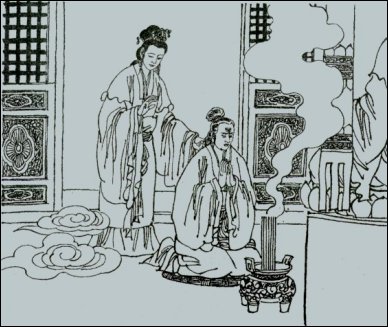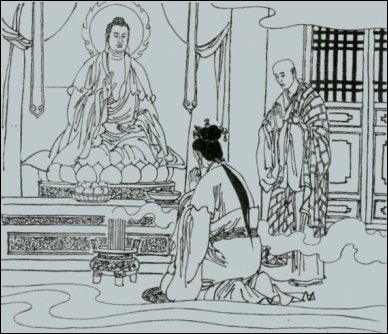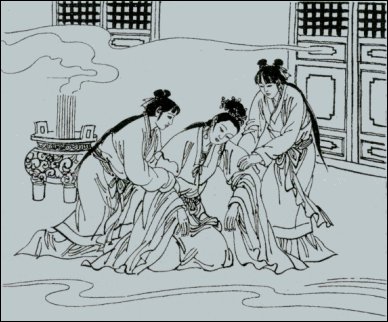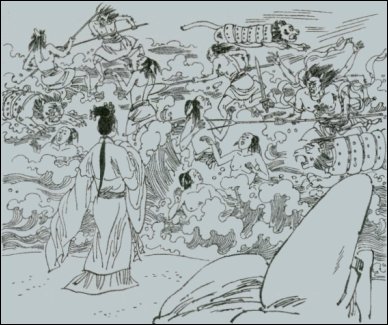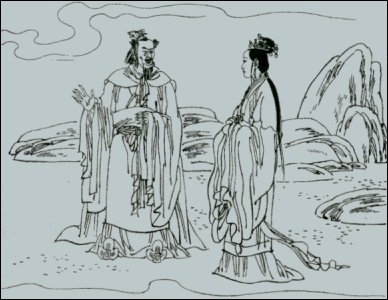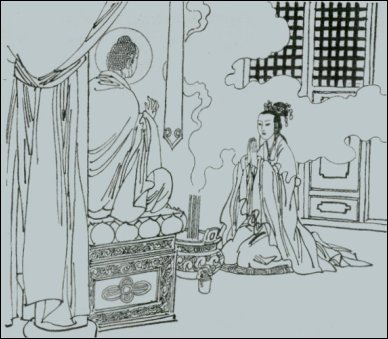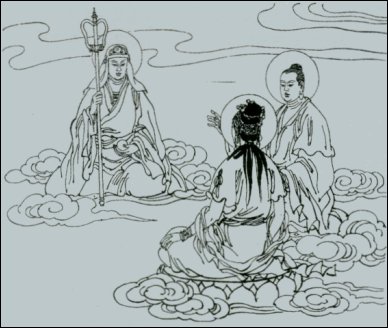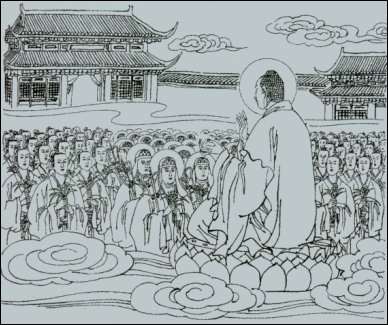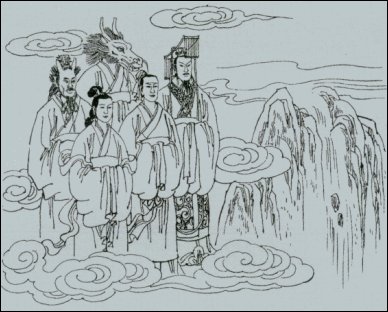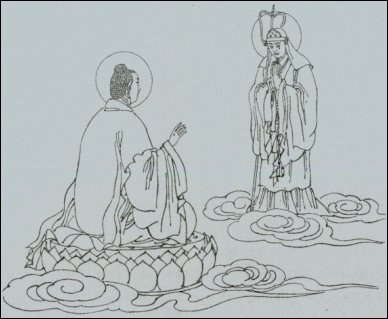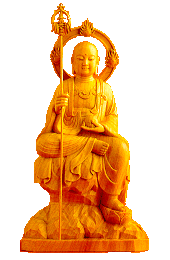   |
|
Chapter One Sutra: Moreover, unthinkable Asamkhyeya Kalpas ago there was a Buddha named
Enlightenment-Flower Samadhi Self-Sufficient King Thus Come One. That
Buddha's lifespan was four hundred thousand million Asamkhyeya Kalpas. Commentary: In this Buddha's name the term "Enlightenment-Flower" represents a cause and "Self-Sufficient King" a result. Enlightenment-Flower is a root and Self-Sufficient King a branch. While still on the causal ground, while still cultivating toward Buddhahood, this Buddha planted the cause of the Enlightenment Flower and then used Samadhi to cultivate the result and become Self-Sufficient King. In this case, Samadhi is both the cause with which he cultivated and the effect attained through cultivation. The lifespan of the Buddha may be explained in several ways, and it is important to realize that in Chinese the concept "lifespan" is made up of two terms, one of which corresponds to duration, or longevity, and the other to the continuity of the life itself. In the Dharma Blossom Sutra, it is said that the Dharma body of the Buddha is not separate from Dharmas, and this coexistence with all Dharmas constitutes its longevity. The fundamental principle of Suchness constitutes the life of the Dharma body. The lifespan of the retribution body is based on Reality Wisdom and the interactive response of wisdom and its objects. In these terms the states that are known are identical with the wisdom that knows. Thus, all states are instantly and fully understood. Although wisdom and its states are originally a duality, they function as a single entity that constitutes the longevity of the retribution body. The lifespan of the retribution body is made up of wisdom alone. The third of the Buddha's three bodies is the response, or transformation, body. The longevity of this body is the hundred-year duration of a human lifespan. This body's life is determined by causal conditions and circumstances. The lifespan of the Buddha may also be explained in terms of the Sutra of the Sixteen Contemplations. According to this explanation it is not necessary to break down the term "lifespan" into its constituents. The transformation body is said to have a lifespan that shows a beginning and an end, the Buddha's birth and entry into Nirvana. The retribution body displays a beginning but no end, since once it is obtained it is everlasting. The Dharma body shows neither beginning nor end; it is not long-lived nor is it short. The lifespan of four hundred thousand million Asamkhyeya Kalpas discussed here is that of this Buddha's transformation body.
Sutra: During the Dharma-Semblance Age there was a Brahman woman who had
much merit from former lives and who was respected by everyone. In walking,
standing, sitting, and lying down she was surrounded and protected by
gods. Her mother, however, had improper belief and often slighted the
Triple Jewel. Commentary: In every Buddha's Dharma there are Three Ages, an Age of Proper Dharma, a Dharma-Semblance Age, and a Dharma-Ending Age. In the first of these, Bhiksus, Bhiksunis, Upasakas, and Upasikas study and cultivate with great sincerity, and many of them attain the fruits of the path. During the Dharma-Semblance Age there is less practice, and effort is applied to externals. Such a period is strong in the construction of temples, stupas, and pagodas, as people seek for blessings but do not seek for wisdom. In the final period, the Dharma-Ending Age, there is emphasis on fighting and strife. The Proper-Dharma Age lasts for one thousand years, as does the Dharma-Semblance Age. The Dharma-Ending Age, in which we now live, lasts for ten thousand years. After the Nirvana of Enlightenment-Flower Samadhi Self-Sufficient King Thus Come One, there was a woman who lived during the Dharma-Semblance Age who was of the Brahman, "pure," class. The pure practices of Brahman cultivators include vegetarianism and celibacy, conditions without which there cannot be purity. Although the Brahmans cultivate purity, they cultivate haphazardly, a little in one direction and then a bit in another, so that they never do attain an ultimate principle. This ancient religion of India still exists today; we recognize it in Yoga, which is one of its practices. If the word "Brahman" were to be applied to Chinese civilization, it would be said to refer to the Taoists, who cultivate similar practices. The Brahman woman in question was well regarded by everyone, and because she had done many meritorious deeds in the past, her physiognomy was full, It is possible to tell from a person's appearance whether or not he has had any merit, for one whose merit is complete will have full and harmonious features, while those without merit will be ugly. The Buddha's wonderful appearance, for example, is a result of countless meritorious acts, The term "thousand blessings," which has been previously discussed, may also be explained as the one thousand good deeds, which constitute one blessing. Consequently a million good deeds make a thousand blessings, which, once perfected, lead to the Thirty-two Marks and Eighty Minor Characteristics. When the Sutra text says that her mother had improper belief, it does not mean merely that she believed in improper teachings; it means that she only half-heartedly believed. For example, she may have believed in the Buddha one day, and then had doubts about him the next: "I have never seen a Buddha, and although there are Sutras, there doesn't seem to be much that is special about the Dharma. The Sangha is just composed of common people, as far as I can see. Why should I respect them?" This is the brand of thought, which is called "improper belief," If one does not have a proper heart, he has an improper one. Another example of improper belief concerns the externalist way, which offers to set up a person as emperor for cash, say, a million dollars. Fools with improper belief fall prey to such charlatans and lose their wealth, How could the imperial position be so easily bought? Nowadays, in democratic countries, such a swindle would be even easier since people think they can buy the presidency, The argument might run, for example, "The only reason you have not become president is that you are a woman. For a mere million I guarantee that in the next life you will be president." People with improper belief may fall for such schemes, but when the next life comes around, whether they are president or not, they won't find any million dollars. Of course, if one could give a million and then become president in that very same life, it would not be a case of improper belief, since there would have been some principle in the initial belief. There is, however, no principle at all in improper belief. Some people will cheat a woman by telling her that for an offering of a hundred, a thousand, or whatever, she can be assured of a male body in her next life. Thinking she has a good deal, she pays; no small number of externalist teachers are kept thus in wine, women, and song. None of these offers hold any guarantee, none of them demand proper belief. In addition to these, there are a great many other methods used to defraud those who have improper belief. Among such frauds are those who say things like, "Why believe in the Buddha? You can be a Buddha right now. Just fork over sixty-five dollars for this genuine, authentic Dharma transmission. That's all there is to it." Although money can be used to do good deeds and cultivate merit, Buddhahood cannot be bought. Even when merit is accomplished, there must still be cultivation; meditation must be perfected. If the position of Buddhahood were negotiable, Sakyamuni Buddha could have purchased it. There would have been no need for his six years of austerities in the Himalayas, no need for him to sit beneath the Bodhi tree, see the stars at midnight, and understand the Way. As a prince he could have bought anything, but Buddhahood is not bought with money.
Sutra: That wise woman worked many skillful plans to entice her mother
to hold right views, yet the mother did not totally believe. Before
long her life ended and her spirit fell into the uninterrupted hell. Commentary: The Brahman woman often used skillful means and spoke provisional teachings that met her mother's needs and that her mother could accept. She told her mother of the benefits of Buddhadharma, teaching her much as one would entice a child with candy. Although her mother sometimes felt that all this talk of Dharma was interesting, she was never certain and only half believed. Before long she died. Death is an extremely good thing! The dead know nothing; they don't worry about eating, about clothing, nor about working or sleeping; the dead do nothing at all. Death is an extremely bad thing! The dead may fall to the realms of the hells; the dead may turn into hungry ghosts; they may find themselves reborn among the animals. Those who do good deeds will find themselves born in the Three Good Paths; those who do wrong will arrive in the state of woe. Not long ago a group of military men visited us. I spoke to them about the responsibilities of the military and told them that among soldiers there are both Bodhisattvas and Asuras. Bodhisattvas appear to teach people to kill less; Asuras in the military delude soldiers, saying that all-out slaughter is the highest action, one that leads to rank and status. Bodhisattvas, too, may attain rank and status, but theirs is derived from pacifying the world. I told our visitors that they should model themselves on the Bodhisattvas and not the Asuras and then gave them an example. The general Kuan Yu of the Three Kingdoms period killed many people, yet after his death he became a Bodhisattva since he killed only evil men. General Pai Ch'i of the Ch'in Dynasty also killed a great many people, and after his death he became, in turn, a horse, a cow, a pig, and other beasts because he had buried alive in a huge pit two hundred thousand soldiers who had already surrendered to him. After I had discussed this matter, a young officer asked if I really believed that people could become animals after their death. I replied, "If you believe that people can become animals, that is fine, and if you don't believe, that also is fine. If you are due to become an animal in your next life, and you believe that people can be reborn as animals, then you will end up as an animal; if you don't believe that you can become an animal, and you are due to become one, then, your disbelief notwithstanding, you will become an animal all the same. If you do the deeds of a Buddha, you will become a Buddha; if you do the deeds of a Bodhisattva, you will become a Bodhisattva; if you do the deeds of a human, you will be born among men; and if you do ghostly deeds you will end up among the ghosts. You are what you do. It is not a case of your belief making the situation to go one way, and your disbelief making it go another. Believe it or not, you will be what you ought to be and you will certainly not be what you should not be." At this point everyone should ask himself, "When am I going to die? The Sutra says that the life of the Brahman woman's mother ended before long. When will mine end? Will I, like her, fall into the hells?" When studying Sutras the important point is to reverse one's illumination; in other words, study yourself a little. Simply to study the books and let it go at that is useless. Everyone, without exception, is going to die. Don't worry whether death is a good thing or not; if you do good, your death will be good, and if you do bad, your death will be horrible. If you plant good deeds you will reap good fruits; if you plant bad deeds you will reap bad fruits. An ancient author said,
If you do not fear death, then die right now. Why can't you? Death is not a matter of fear or lack of it; it is a question of good and bad. Accidental deaths, such as those caused by natural disasters, airplane crashes, train derailments, and the like, are bad deaths; good death is dying when you wish. If you wish to avoid death, cultivate the Way. Cultivators can attain independence from life and death and live if they wish; or, if they do not wish to continue life, they can sit in meditation and leave, entering Nirvana. In order to do this, of course, they must have some skill in cultivation. Those who have such skill hold power over their own life and death and can die when they wish to; or, if they wish to live, they can live forever. The time may come when such a cultivator desires to leave the Evil World of the Five Turbidities because it is too unclean. When he wishes to do this, one who has cultivated can die at will. When the text says that her spirit fell into the uninterrupted hell, it refers to her Eighth Consciousness. The uninterrupted hell is so named because there is no interruption in time, in life, or in body. When one person occupies it, it is full, yet it can also be full of many people. This hell will b described later on; for now, let it suffice to say that suffering is undergone endlessly and as soon as death occurs there is instantaneous rebirth into the same continuously tormented body.
Sutra: Knowing that when her mother was in the world she had not believed
in cause and effect, the Brahman woman realized that, in accordance
with her karma, her mother would be reborn in the states of woe. Thereupon
she sold the family house, procured incense, flowers, and other items,
and performed a great offering in that Buddha's temple. Upon seeing
the awesome and majestic image of the Thus Come One Enlightenment-Flower
Samadhi Self-Sufficient King in the temple, the Brahman woman became
doubly respectful. As she gazed at the venerable image she thought to
herself, 'Buddhas are also called Greatly Enlightened Ones Complete
With All Wisdom. If the Buddha were in the world and I were to ask him,
he would certainly know where my mother had gone at death.' The Brahman woman wept for a long time with lowered head and then
fixed her gaze on the Thus Come One. Suddenly a voice was heard in space,
saying, '0 weeping holy woman, do not be so sorrowful, I shall show
you where your mother has gone.' The Brahman woman placed her palms together toward space and said,
'What divinity is this who comforts my grief? From the day I lost my
mother onward I have held her in memory day and night, but there is
nowhere I can go to ask about the realm of her rebirth.' Commentary: As she looked at the image of the Buddha, her gaze became fastened to it as if by a cord, unwilling to leave it. Attentive in body and without extraneous thoughts, she had a pure mind, and she heard a voice address her from space, calling her a holy woman. Although her mother had committed offenses, she herself had very good roots and thus could be called by such a name. The meaning behind the Brahman woman's response to the voice from space is, "My mother bore me and I should have been filial. Now my mother has died because I have not been filial; I am extremely grieved." There is a couplet, which says,
The kindness of parents is as boundless as the sky, higher than heaven, and broader than earth, and so the Brahman woman felt remorse and shame that she had been unable to repay such compassion.
Sutra: A voice again resounded from space and said to the holy woman, 'I
am the one whom you behold and worship, the past Enlightenment-Flower
Samiidhi Self-Sufficient King Thus Come One. Because I have seen that
your regard for your mother is double that of ordinary living beings,
I will now show you the place of her rebirth.' On hearing this voice the Brahman woman suddenly leaped up and fell
back, breaking all her limbs. Those around her picked her up, and after
she had been revived for awhile, she spoke into space and said, 'Please
pity me and quickly tell me my mother's realm; my own death is no far
off.' The Thus Come One Enlightenment-Flower Samadhi Self-Sufficient King,
spoke to the pious woman and said, 'After your offering is complete,
return home quickly. Sit upright thinking of my name and you will certainly
know your mother's place of rebirth.' After she had finished worshiping
the Buddha, the Brahman woman returned home, where, mindful of her mother,
she sat upright re-collecting the Thus Come One Enlightenment-Flower
Samadhi Self-Sufficient King. After a day and a night she suddenly saw herself beside a sea whose
waters seethed and bubbled. Many horrible beasts with iron bodies flew
about the sea, rushing in every direction. She saw hundreds of thousands
of millions of men and women rising and sinking in the water, being
mauled and devoured by the beasts. She beheld Yaksas as well, each with
a different form. Some had many hands, some many eyes, some many legs,
some many heads. Sharp, sword-like teeth protruded from their mouths,
and they drove the offenders on toward the beasts. Some Yaksas seized
the offenders and twisted their heads and feet together in a myriad
horrifying shapes at which none would dare look. Commentary: Why is it that when you study Dharma nothing much happens? Why was the Brahman woman able to influence the Buddha to speak to her? It was simply a result of her utter sincerity and concern for her mother that the Buddha, who had long since entered Nirvana, appeared to speak to her. Although she had taken a severe fall, breaking most of her bones, the Brahman woman finished her offering and made full prostrations to the Buddha in spite of her pain. She then returned home and, ignoring her sufferings, sat upright reciting the Buddha's name for an entire day and night. During this time she neither ate nor drank, and did not even relieve herself, but single-mindedly worked at recollecting the Buddha. Then she saw herself by a sea. There is an important point to be clear about. She was not having a dream. Because of her complete sincerity, her spiritual nature left her body. Within the body there resides the Eighth Consciousness. When one sits for a long while, stops everything and forgets pain, and practices only undeviating single-mindedness, the Eighth Consciousness may be able to leave the body. This state may occur in cultivators who sit for long periods of time. When this state occurred to the Brahman woman, she saw herself by the side of a sea. When the Five Eyes in the ordinary flesh body are not opened, such things cannot be seen, but if they are open, ghosts, spirits, Bodhisattvas, Buddhas - everything is visible. Even if the flesh body of a cultivator has not opened the Five Eyes, his spiritual nature has them, and when it leaves the body it can see all manner of things. When she found herself by the side of the boiling sea that was full of people being devoured by evil beasts, she also saw a great many Yaksas, "speedy ghosts," who run and fly at about the speed of light. Because people are smarter than beasts, the men and women in the sea occasionally managed to outwit the animals and escape only to be confronted by Yaksas. Behind them were beasts, before them were Yaksas, and there was no place to hide, as in the line that says, "Ahead there is no road to take, behind the soldiers push." Both the beasts and the Yaksas seized the people in their talons. Sometimes Yaksas grabbed the beasts and twisted their feet and heads together, and occasionally the beasts would do the same thing to the Yaksas. Both of them twisted and tied the offending people into the most grotesque and hideous forms possible, shapes that no one would even dare look at.
Sutra: During this time the Brahman woman was calm and fearless because of the power of recollecting the Buddha. A ghost king named Poisonless bowed and came to welcome the holy woman and said, 'Excellent, 0 Bodhisattva. Why have you come here?' The Brahman woman asked the ghost king, 'What is this place?' Poisonless replied, 'This is the first sea of the western face of
the Great Iron Ring Mountain.' The holy woman said, 'I have heard that hell is within the Iron Ring. Is this actually so?' Poisonless answered, 'Hell is really here.' The holy woman asked, 'How have I now come to the hells?' Poisonless answered, 'No one can come here unless he has either
awesome spirit or the required Karma.' The holy woman asked, 'Why is this water seething and why are there so many criminals and evil beasts?' Poisonless replied, 'These are the newly dead beings of Jambudvipa
who have done evil deeds and who, during the first forty-nine days after
their death, had no survivors to perform acts of merit on their behalf
and rescue them from difficulty. Moreover, during their lives they planted
no good causes. In accordance with their own deeds the hells appear,
and they must first fathom this sea. Ten thousand Yojanas east of this
sea is another sea, which has double the sufferings of this one. East
of that is yet another sea where the sufferings are doubled still again.
What the combined evil causes of the Three Karmic Vehicles evoke is
called the sea of karma. This is that place.' Commentary: The Great Iron Ring Mountain is one of the mountains outside Mount Sumeru, and beyond it is hell. Hell exists and is not merely a human fiction. The only ways to reach hell are through spiritual penetrations and virtuous conduct or by committing offenses. The Three Karmic Vehicles are the body, the mouth, and the mind. There are three evils enacted by the body: killing, stealing, and sexual misconduct. There are three of the mind: greed, hatred, and stupidity. The mouth can commit four evil deeds: vulgar speech, false speech, harsh speech, and duplicity. Vulgar speech is improper talk of sexual affairs; false speech is lying; harsh speech is scolding and berating others; and duplicity is saying to Smith that Jones is wrong, and then to Jones that Smith is wrong: one tongue speaking in two ways. Taken together, these are called the Three Vehicles of Karma.
Sutra: The holy woman again asked the ghost king Poisonless, 'Where is hell?' Poisonless answered, 'Within the three seas are hundreds of thousands
of great hells, each one different. There are eighteen that are specifically
known as great hells. In succession there are five hundred with unlimited
cruel sufferings, and further there are over one hundred thousand with
limitless sufferings.' The holy woman again spoke to the ghost king. 'My mother has not been dead long, and I do not know on what path her soul has gone. ' The ghost king asked, 'When the Bodhisattva's mother was alive, what were her habitual deeds? ' The holy woman replied, 'my mother had wrong views and ridiculed
and slandered the Triple Jewel. Even if she occasionally believed, it
was short-lived and turned again to disrespect. Although she has been
dead but a few days, I do not know the place of her rebirth.' Poisonless askedd, ' what was the Bodhisattva's mother's name and clan?' The holy woman replied, 'my parents were both Brahmans; my father's
name was Sila Sudarshan, my mother's name was Yueh Ti Li.' Commentary: The word "sea" represents a large quantity and does not necessarily denote an actual body of water. Here it symbolizes the powerful karma of living beings, as vast as a limitless sea. The three seas represent the deeds done by the bodies, mouths, and minds of living beings. There are hundreds of thousands of ten thousands of hells, each one with its own attributes, each hell corresponding to an evil deed done by a living being. Hells are not prepared before beings fall into them; rather they are manifestations of the various particular karmas of beings. Whatever evil deed a being has done elicits a corresponding hell. For example, in the roasting hell there is a large hollow brass pillar full of fire. Those guilty of sexual misconduct fall into this hell and see the roasting pillar as a person. Men, for example, see it as a beautiful woman whom they rush to embrace, only to find themselves burned so badly that they cannot pull their seared flesh away from the pillar. A woman sees the pillar as her most beloved partner in life and rushes to him only to be seared to death. As soon as death occurs in the roasting hell, a wind called the "Clever Breeze," a wonderful Dharma, blows and revives the dead, who then forget the painful consequences of their behavior, recalling only its pleasurable aspects. Driven by this memory, they rush to the pillar again, only to find the cycle repeated. The roasting hell is only one of the many hells, and each one is unique. Eighteen are called great, and within each of these eighteen there are eighteen subsections. The ghost king knew that the woman must have come to the hells because of her great spirit and vows, and consequently he addressed her as a Bodhisattva. The Brahman woman had to admit that she could not hide her mother's errors and flaws, and told the ghost that her mother had held wrong views. "Improper views" is one of the Five Sharp Causes, which are:
The first of these, the view of a body, is the constant drive to pamper the body and never let it sustain the slightest loss or discomfort. People whose actions are based on this view may eat themselves into obesity, thinking that the more flesh they have, the better their health. Day in and day out, there is nothing but: constant concern for the maintenance of the body. Those with extreme views maintain radical positions tenaciously. If a person whose behavior is characterized by extreme views likes to smoke, for example, and is told by others that it is harmful and should be given up, he may stubbornly reply that his adviser obviously has not yet understood the wonderful advantages of the habit, for if he had, he too would smoke and not give it up. Extremist views lead people to propound all sorts of bombastic arguments to defend themselves, but while they may talk cleverly, they are truly foolish. People with improper views maintain totally erroneous views. For example, on hearing the virtues of filial piety praised, they might reply that it is useless, that parents have children only as a result of desire for pleasure, and that the children should be ignored or, even better, allowed to die a little sooner to save the world the trouble of supporting them. The fourth of the Five Sharp Causes, seizing on views, is characterized by grasping and holding on to any number of improper views. The fifth, views of prohibitions, is characterized by maintaining improper precepts. For example, once, when some people heard that Buddhists are vegetarians, they replied that anyone can do so simple a thing as abstain from meat, but a really able person would abstain even from salt. This kind of talk leads to slander and ridicule of the Triple Jewel, for such persons are apt to find fault with anything at all. Their behavior is similar to that of horse-traders, who will closely inspect a fine horse by diligently blowing on the hairs of the mane to expose minor skin blemishes. People who ridicule and slander the Triple Jewel will say things such as, "How are Buddhists different from any other people? They eat, drink, and do what everyone else does. They too have flaws; as a matter of fact, they are totally criminal elements of society who will do anything at all. The Buddha is just an image, the Dharma is nothing but ordinary words on paper, and the Sangha is made up of ordinary folk who are not the least bit deserving of respect." When people speak like this they sometimes lead those who believe the Buddha to hide their faith and be secret Buddhists. Some time ago, a man who comes to this temple occasionally said that he wished to take refuge, but only if he could do so in secret. I did not accept him. Taking refuge with the Triple Jewel is not like stealing. Why do it in secret? I told him that there was no secret refuge-taking here, and that he had better wait until he was a little more clear about what he felt. His problem was that he was a Catholic and feared that many of his friends would brand him a heretic. I told him that if he tried to keep it a secret he would be even more sinful. How can anyone believe in the Buddha and still act in such a fashion? How pitiful. Those who believe in the Buddha should have an eternal faith, not faith like that of the Brahman woman's mother, who believed one hour and disbelieved the next. Don't be a "five-minute blaze," so that, after an ardent but brief moment of belief, you turn around and say boldly, "What is so wonderful about this?" Within the Indian caste system there were four major groups: Brahmans, the pure caste; Ksatriyas, the royal class; Vaisyas, the merchant class, and Candalas, butchers and the like. Those of the lowest classes cold not walk on the same roads as the pure Brahmans and even had to wear insignia so that they could be recognized. India, like England, was an extremely class-conscious society, and upper-class people might not even dare speak to lower-class people, lest they be scorned by their peers. The name of the Brahman woman's father means "cool and refreshing good view." Her mother's name has been transcribed into Chinese, and there is no tradition of commentary to explain the original Sanskrit. In spite of this I shall go ahead and give a commentary. The first character used to transcribe the name, Yueh, means "to be favored," and the second character, Ti, means "an emperor." Thus her name can be explained as meaning that she was favored by the emperor because of her great beauty. There is nothing fixed about people's names, and they can be explained in any way, provided the explanation is reasonable.
Sutra: Poisonless placed his palms together respectfully and told the Bodhisattva,
'Please, Holy One, return to your original dwelling. Do not be worried
or sorrowful, for the criminal woman Yueh Ti Li was born in the heavens
three days ago. It is said that she was succeeded by a filial child
who made offerings and cultivated merit for her sake in the temple of
Enlightenment-Flower Samadhi Self-Sufficient King Thus Come One. Not
only has the Bodhisattva's mother obtained release from hell, but, as
a result of so much merit, other offenders deserving of uninterrupted
retribution have also attained bliss and have been reborn.' When the
ghost king was finished speaking, he withdrew, with palms still respectfully
joined. The Brahman woman quickly returned as if from a dream, understood
what had happened, and swore a deep vow before the image of Enlightenment-Flower
Samadhi Self-Sufficient King Thus Come One in the temple, saying, 'I
vow to establish many expedient devices in response to living beings
who are suffering for offenses. Until the end of future aeons, I shall
cause those beings to obtain liberation.' Commentary: When the text says that she understood what had happened, it means that when she returned, she remembered clearly the entire episode with Poisonless and knew that it was not a false imagining or a dream but rather was due to the power of the Buddha. She thereupon made the vow, which reaches throughout unending aeons.
Sutra: The Buddha told Manjusri, "The ghost king Poisonless is the
present Bodhisattva Wealthy Leader. The Brahman woman is now Earth Store
Bodhisattva." Commentary: There are seven treasures of cultivation, all of which have been attained by the Bodhisattva Wealthy Leader. They are faith, morality, learning, giving, wisdom, a sense of shame, and a sense of remorse.
Chapter Two
Sutra: At that time the redulplicated bodies of Earth Store Bodhisattva
assembled in the Palace of the Trayastrimsa Heaven from a hundred thousand
tens of thousand of millions of inconceivable, unutterable, ineffable,
Asamkhyeyas of worlds, from all the places where there are hells. Because
of the spiritual power of the Thus Come One, each came from his own
direction together with thousands of ten thousands of Nayutas of those
who had obtained liberation from the paths of karma. All came holding
incense and flowers as offerings to the Buddha. Because of the teachings
of Earth Store Bodhisattva all of those who came were irreversible from
Anuttarasamyaksambodhi, even though long Kalpas ago they had been wandering
in birth and death, undergoing suffering within the Six Paths without
even temporary respite. Because of Earth Store Bodhisattva's great compassion
and deep vows, however, each had borne testimony to the fruits. When
they came to the Trayastrimsa Heaven, their hearts jumping, they gazed
at the Thus Come One, their eyes not leaving him for a moment. Commentary: It could be said that the reduplicated body is also the "reduplicated spirit," "reduplicated nature," or "reduplicated heart." Bodhisattvas have a kind of spiritually efficacious response, and thus it is said," A penetration effected, every where there is response." This is also what is meant by the phrases,
The moon is reflected in as many pools of water as there are; if there are ten thousand pools, there are as many reflected moons. The moon in the pool represents the "spiritual" being discussed here. It is also "nature" and you might say a "thought" as well. Although there are the appearances of a thousand moons reflected in a thousand pools, the substance of the moon does not reduplicate. Likewise, the reduplicated bodies of Earth Store Bodhisattva do not exist except in response to the circumstances created by living beings. By way of a simple analogy, the reduplicated bodies are like photographs. Originally, there is just one person, but an unlimited number of copies of his photograph may be made. The difference between photographs and reduplicated bodies is that the photographs do not have the ability to function, spiritual response, or the breath of life. The reduplicated bodies of Earth Store Bodhisattva, on the other hand, are identical with his original body and are referred to as the "hundred thousand million transformation bodies." Wherever Earth Store Bodhisattva sees a hell, no matter where in the world system of a billion worlds it may be, he dispatches a transformation body to teach living beings there. He does this in accord with his vow to teach all the living beings in the hells. The number of worlds from which the reduplicated bodies of Earth Store
Bodhisattva returned to the Trayastrimsa Heaven is completely beyond
calculation or comprehension, for the reduplicated bodies exist because
of the needs of the limitless number of living beings who are flowing,
floating and drowning, dying, and then being reborn again and again
in the wheel of life and death, as many as waves on the sea. Because
of Earth Store Bodhisattva's great compassion and deep vows, many had
borne testimony to the fruits of the path. He vowed, "Only when
the hells are emptied will I become a Buddha; only when living beings
have all been saved, will I attain to Bodhi."
Sutra: At that time the World-Honored One stretched forth his golden-colored
arm and rubbed the crowns of all the reduplicated bodies of Earth Store
Bodhisattva, from the hundreds of thousands of tens of thousands of
millions of unthinkable, unutterable, immeasurable, ineffable, limitless
Asamkhyeyas of worlds, and said, "I teach and transform obstinate
living beings within the evil worlds of the Five Turbidities, causing
their minds to be regulated and subdued, to renounce the improper and
return to the proper. One or two of ten, however, have bad habits remaining
and I also divide into hundreds of thousands of millions of bodies in
order to establish numerous expedient devices for them There are those
off keen roots who hear and the faithfully accept; there are others
who have already reaped good retribution and who have been energetically
exhorted to accomplishment. Yet others are dark and dull and must long
be taught and transformed in order to effect their return, while others
whose Karma is heavy do not give rise to respect. The reduplication
bodies cross over and release all of these manifold kinds of living
beings by being manifested as the bodies of men, women, gods, dragons,
spirits, or ghosts. They may be manifested as mountains, forests, streams,
springs, and rivers; as lakes, fountains, or wells, in order to benefit
people. All of these may save beings. The bodies of divine emperors,
Brahma kings, wheel-turning kings, laymen, kings of countries, prime
ministers, officials, Bhiksus, Bhiksunis, Upasakas, Upasika, Sound-Hearers,
Arhats, Pratyekabuddhas, and Bodhisattvas, may be manifested in order
to teach and rescue beings. It is not only the body of a Buddha which
manifests." Commentary: The World-Honored One rubbed the limitless crowns of the transformation bodies by means of his total psychic power, which enables one arm to become a hundred thousand, and said, "I teach and transform obstinate living beings within the evil world of the Five Turbidities." Perhaps "obstinate living beings" includes you, perhaps someone else. Anyone who does not follow the teachings and continues to be unruly is obstinate. It particularly means many Americans who very strongly dislike following rules. Just look at the situation here. As soon as children reach a certain age, they begin to ask why there have to be so many rules. Unruly adults come from children who do not like to follow rules. Subdued minds are harmonious and delight in receiving Dharma, neither opposing nor doubting it. "Keen roots" refers to those whose merit from past lives is extremely great, who are intelligent, and who have a great deal of wisdom. On hearing Dharma they accept it. There are also those who have reaped good retribution. In past lives they may have done deeds to plant the seeds, which bear good fruit. Those who have been energetically exhorted to accomplishment have been exhorted more than once. If, for example, you decide to cross someone over and are not initially successful, keep trying. If they are far away, write letters explaining Buddhadharma to them, and if they are nearby, visit with them now and again and discuss Buddhism. Cross others over, but do not be crossed over by others. For example, you set out to cross someone over to believe in the Buddhadharma and what happens? He makes a Christian out of you. This is what is meant by being crossed over by others. To cross others over is to have wisdom; to be crossed over by others is to be foolish. Therefore, the text says "energetically." Do not exhort others once or twice but many times. If you have not been effective, keep at it again and again, right up to the point where you become a Buddha. There are those who are dark and dull, that is, ignorant, who must be transformed for a long time in order to return. Long means not merely once or twice, not even three or four times. Here, however, it is simply a matter of an unfixed time. If I cannot cross you over in one day, then I will do it in two or three, in a month, a year, or even three, four, or five years. My resolve to cross you over will be a long lasting one, so that eventually you will come to believe in the Buddha. Sakyamuni Buddha reduplicates into many bodies in order to release all beings, each of whom has his own particular circumstances and his own karma. These transformation bodies are manifested in many forms, perhaps as a handsome man in order to cross a woman over, or perhaps as a beautiful woman to cross over men. He does this because he knows that, as a result of their heavy desires, most living beings like male-female relationships. Consequently, the Buddha is manifested in accordance with this basic nature of living beings in order that they may more easily be taught. The transformation bodies may be divine beings or dragons in order to cross over gods and dragons. They may be the imposing spiritual virtues of spirits, or the bodies of great ghost kings. Mountains, forests, streams, and springs are all manifestations of the Thus Come One's Dharma-body. We, along with all of San Francisco, are sitting in the Thus Come One's Dharma-body but don't know it. "Old Gold Mountain" (San Francisco) was manifested by the Buddha long ago in order to benefit the living beings who might live here. Although the text says mountains, forests, streams, and springs, don't think that the level earth is not the Buddha's Dharma-body, for it is. We are all a part of the Buddha's Dharma-body, but we can't see it, because we are like ants walking along the ground, unable to see the big picture. We are tiny bugs on the Dharma-body, we just don't know it. A mountain may appear, for example, and as you climb it you may receive its spiritual energies and attain enlightenment. You may smell the fresh air of the Buddha's Dharrna body while in the forest and become enlightened. You should not think that five hundred years after the Buddha's nirvana it became impossible to realize nirvana; it can be done even now. The only thing to be feared is that you will not work. If you do work, I will provide guaranteed insurance for you. When you have opened yourself to enlightenment, you will be able to collect on the policy. Of course, once you have become enlightened, you will not want to bother collecting the money, and so I'll still come out ahead on the deal. You may be bathing in a river and feel very comfortable, after which you attain enlightenment; the river is just a manifestation of Sakyamuni Buddha. The water from wells is similar: you may drink it, and day by day your resolve for the Way increases. All of these are inconceivable events. In general, every move of the Buddha's is undertaken for the benefit of living beings. While you sit in meditation Sakyamuni Buddha may be manifested in the body of a heavenly emperor who bows to you and tells you that he is lord of the heavens. He comes to encourage you because you have firmly resolved to attain the Way. A wise wheel-turning king has many kinds of precious treasures, among which is a flying chariot pulled by a horse faster than a rocket. Our rockets, which can go to the moon, require quite some time to get there. The flying chariot of the wheel-turning king, however, can go everywhere within the world system of a million worlds within an hour - not merely to the moon and nearby planets but to other galaxies. A wheel-turning king also has a treasure storehouse, whenever he needs money he just states the amount and the earth opens up, revealing as much as he requires. Because his blessings are so great, all the wealth of the earth is at his disposition. Among his treasures are women. Whenever wise wheel-turning kings wish for a woman, one appears spontaneously. Everything accords with the will of such a king, and he is not subject to the suffering of denial of his desires. The Buddha may be manifested in such a wheel-turning king, and when living beings see him, they resolve their thoughts on the Way. Aside from wheel-turning kings, one never knows which of you laymen might be a manifestation of the Buddha. Bhiksus, Bhiksunis, Upasakas, Upasikas: Sakyamuni is manifested in many bodies other than his own Buddha-body in order to cross over living beings.
Sutra: At that time the reduplicated bodies of Earth Store Bodhisattva
from all the worlds returned together to a single form which, weeping
with pity, said to the Buddha, "Throughout long aeons I have received
the Buddha's guidance, which has caused me to obtain inconceivable spiritual
power and great wisdom. My reduplicated bodies fill as many worlds as
there are grains of sand in a hundred thousand tens of thousands of
Ganges Rivers. In each of those worlds, I transform into tens of thousands
of millions of bodies, each of which crosses over a hundred thousand
tens of thousands of people and causes them to return respectfully to
the Triple Jewel, eternally leave birth and death, and reach the bliss
of Nirvana. Even if their good deeds within the Buddhadharma are as
little as a hair, a drop, a grain of sand, a mote of dust, or a stand
of down, I shall gradually cause them to be liberated and attain great
benefit. World-Honored One, do not be concerned about future living
beings with evil Karma." Thus he spoke three times: "World-Honored
One, do not be concerned about future living beings with evil karma." At that time the Buddha praised Earth Store Bodhisattva and said,
"Very good, very good, I shall help in this work you so willingly
undertake. When you fulfill these great vows after long and distant
Kalpas, you will instantly testify to Bodhi." Commentary: You should contemplate accumulated Kalpas, a period so long that it cannot be known. Throughout this time Sakyamuni Buddha will energetically undergo suffering, without a moment for laziness, happiness, or pleasure, in order to release and cross over living beings. Do not think, "Oh, well, I'm probably not included." You are certainly included among living beings, who are obstinate and difficult to transform. How much of his heart's blood has Sakyamuni Buddha expended to transform and teach us, and yet we still do not know a sense of shame. We think that everything is just fine and that there is no problem. "It's not so important," we say, "if Sakyamuni Buddha has to suffer a bit more, it's no matter. I don't have to study Buddhadharma now because it will not matter if I fool around for a while." You explain principles for yourself in this way, and act as your own defense lawyer. Although Earth Store Bodhisattva's one body reduplicates to become many bodies, the many return together and become one. The many bodies are just one and the one is many. To speak of this in greater depth, there are neither many bodies nor one body; Earth Store Bodhisattva basically has no body at all. How can we say this? It is because he has no thought of a self. Although he has many bodies, they are not many, and although he has one body, it is not one. One is many, many is one. Earth Store Bodhisattva reduplicates into many bodies, which then all return to one. Which of all these bodies is Earth Store Bodhisattva? Which one is not? Would you say that any particular one of these bodies is his? You could say that, and one of them is. Yet you could say that it is not. You could say that any body he manifests is his body. According to this theory, however, you could say that there is fundamentally no appearance at all, and therefore you could say that these are not his reduplicated bodies. You could also say that any person who vows to study the conduct of Earth Store Bodhisattva is his reduplicated body and is no different from him. People wish to study his conduct because they respect his behavior, his wisdom, and his vows. In fact, you are one of Earth Store Bodhisattva's reduplicated bodies, and that is why you like him. Act in accord with his resolve and vows and you are his transformation body. If you can cultivate in accord with the Buddhadharma, if you have a self-nature, which is replete with blessings and wisdom, if you understand the mind and see its nature, you too will have spiritual powers and will be able to return to Earth Store Bodhisattva. Return together to a single form means to return to the origin, to go back to the source. Earth Store Bodhisattva wept with pity for four reasons. First, the living beings in the Six Paths commit bad' karma an do not change their behavior. They continue to commit offenses in the realms of the hells, hungry ghosts, animals, humans, Asuras, and gods, and still know no sense of shame. Second, living beings are stubborn and difficult to teach. If you explain the Buddhadharma, they often do not listen, but if you talk non-Dharma with them, they enjoy it. If, for example, you praise someone, talk about how learned and well-behaved he is, people will not pay much attention. If, on the other hand, you speak ill of others, they will listen avidly. "Why, did you know, so and so is so clever that he does scores of things you'll never find out about." Yes, people will pay a great deal of attention to this sort of tale, but they will not listen when you tell them to study the Buddhadharma. If you tell them about a mysterious drug that brings about wonderful
and mystical changes, they want to give it a try. Many take marijuana
and LSD and other confusing drugs because they are looking for these
changes. They become confused and muddled yet feel that they have ended
up in the Land of Ultimate Bliss. Although these states are basically
harmful, those who experience them feel that everything has been transformed
- not even heaven and earth are as great as they. When their drug experience
is over, however, they are exhausted and have headaches and general
bodily pain. Third, the Thus Come One was about to enter nirvana, the sun of wisdom was about to set, and Earth Store Bodhisattva was sorrowful. Fourth, in the palace of the Trayastrimsa Heaven, Sakyamuni Buddha instructed Earth Store Bodhisattva to work until Maitreya appeared in the world, crossing over living beings so that they might encounter Buddhas and receive predictions of enlightenment. Earth Store Bodhisattva wept as he was given this extremely important responsibility. Spiritual powers are wonderful and unfathomable; there is no way that these powers can be known. Yet, if you wish to cross living beings over, you must have these powers. Spiritual power, moreover, is not sufficient in itself; you must also have great wisdom. Wisdom and spiritual powers aid one another. To obtain them we should first take refuge with the Triple Jewel because before this we are outside the Buddhadharma. Taking refuge is called "casting off the improper and returning to the proper, leaving the dark and entering the light." Therefore one takes refuge with the Buddha, Dharma, and Sangha. To reach the bliss of nirvana, which has the Four Qualities of permanence, bliss, self, and purity, one must have done good deeds. A hair represents the lightest of good deeds; a drop represents the fewest; a grain of sand represents the most minute of good deeds; and a mote of dust represents the smallest. A hair is extremely light, a drop of water is a very small quantity, the most minuscule particle of sand is a grain, and a mote of dust borders on emptiness - that is to say, one-seventh the size of the smallest particle visible to the naked eye. This is where the work begins. Great benefit refers to becoming a Buddha. Just look how great this benefit is. Earth Store Bodhisattva, with his great wisdom, uses all kinds of inconceivable and wonderful methods, so that even if you want to avoid receiving his teaching, you cannot do so. This is what is meant by the phrase from Confucius, "wishing to stop and yet unable." You might say that you are going to stop studying the Buddhadharma, but you have no way to actually do so. Ah, the wonder is just this very point. Who makes you this way? It is simply through the wonderful functioning of that good, knowing adviser, Earth Store Bodhisattva, of great vows. Earth Store Bodhisattva spoke these words to the Buddha to say that he would take care of all living beings: "Give the responsibility to me," he said. "If living beings have not become Buddhas, I too will not become a Buddha. Only when the hells are emptied will I become a Buddha; only when living beings have all been saved will I attain to Bodhi". He spoke these words three times to show the importance of the matter under discussion. Laws, for example, are passed in this way; after they are read three times, with no objections, they are considered passed. In this case, however, it is not a question of passing or not passing but merely a matter of showing the importance of the statement. On hearing this, wouldn't you say that we ought to be happy? We have
committed so many offenses, and yet we still have the opportunity to
become Buddhas. Ah, how high, how deep is this kindness. So it is said,
"Look up, there is none loftier; drill in, and there is none more
firm." This Bodhisattva's state is truly inconceivable. There are basically Four Great Vows: I vow to save living beings in unending hell; I vow to cut off interminable afflictions; I vow to find unlimited Dharma "doors"; I vow to perfect the unsurpassed Buddha Way. Now that these vows have been put into English, you should ask yourself every day, "Have I saved living beings, or have I been crossed over by them? Did I start out believing in the Buddha and then, after being told by someone else of the glory of Jesus' crucifixion, become a Christian?" If this is the case, then you have been crossed over by others and have not saved them. The same investigation should be made for the other three vows. "I vow to eliminate interminable afflictions. Is it true that when someone spoke harshly to me I got angry and raged in ignorance? If this is the case, then just what have I eliminated?" If you find that you have not been afflicted, you still can't claim to have attained anything. Wait for an opportunity that tests you, and see if you have really rid yourself of all your afflictions. If you have not done so, you have only studied the Buddhadharma superficially; but if you have eliminated them, you have obtained inner peace and entered into the sea of Buddhadharma. "I vow to learn the unlimited Dharma Doors." The doors and entrances into the Buddhadharma are unlimited. It is said there are eighty-four thousand of them, but how could the doors of the Buddhadharma stop at eighty-four thousand? There are far, far more than that. Don't simply think, "I have now learned to recite the Surangama Mantra and that is fine enough." Take a look at the Tripitaka, vast as the sea. If you have obtained only a hair, a drop, a grain of sand, or a dust-mote's worth, you cannot say that you have understood Buddhadharma. If you really penetrate the Buddhadharma and are able to drink the great sea dry in a single gulp, then you have understood. If you cannot do this, you must study more. "I vow to perfect the unsurpassed Buddha Way." This does not need further certification. If we had accomplished Buddhahood, we would not have any questions, for they would all be resolved. Of course, if you have not become a Buddha, you cannot pretend to be one, as some people do, and say, "Not only am I a Buddha, so are you. Everyone is Buddha." Just what kind of a Buddha are you? A greedy Buddha? A hateful Buddha? An ignorant Buddha? An afflicted Buddha? Do not follow arrogant frauds who say they are Buddhas when they are not, who say they are enlightened when they are. The time when Earth Store will testify to Bodhi will be at the extreme
limit of the future. Is it then the case that he will never have an
opportunity to accomplish Bodhi? Don't worry about that. Earth Store
Bodhisattva accomplished Bodhi long, long ago. If he had not done so,
he would not have such inconceivably great spiritual power and wisdom.
He is just waiting for you and me to accomplish it as well. For these
reasons, we should all be courageous and vigorous in working toward
Bodhi, toward enlightenment.
|
